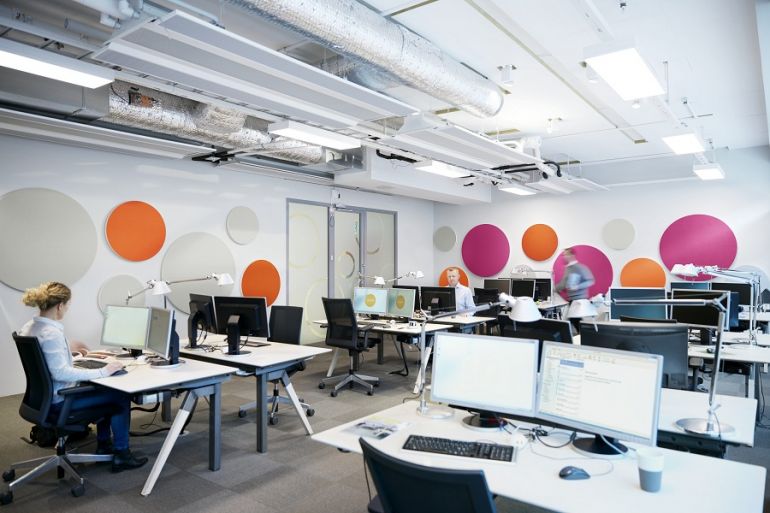Employees of open space offices – both Polish and foreign ones – often complain on noise and lack of privacy. According to surveys, these concerns are justified. The average level of noise during talks, which comes from e.g. communication strings or zones for informal meetings, disturbs and distracts from work. Even if the general level of noise does not exceed the acceptable norms, the sound of understandable talks at the level of 53-55 dB reduces the employees' effectiveness. The results of the conducted research on the impact of noise on well-being of office employees are following:
- people who work in noisy offices more often benefit from sick leaves – the more complicated tasks they have to perform, the stronger correlation;
- work in noise enhances the level of adrenaline by 30 per cent – the constant increased level of adrenaline leads to cardiovascular problems and slower metabolism;
- the sound of talking has a bad impact on motivation to perform difficult tasks (decrease by 66%);
- the noise can reduce the effectiveness by 50% in the case of performance of complex tasks which require logical thinking, especially the medium stimulating ones.
Interestingly, the problem occurs in classical open space offices, and in offices of differentiated space based on the concept of Activity Based Workplace, which consists in dividing of work place for employees depending on a kind of project which is performed by them in a given moment. The noise forbids use of maximum benefits from the modern work environment. This problem can be simply avoided by the use of acoustics and sound-proof materials at the very early stage of designing.
In Poland vs. in modern offices
The survey on satisfaction from work environment in Polish offices was conducted last year and nearly 50% of the employees surveyed by JLL together with Skanska claimed that the noise is the most disturbing factor at work. This problem was even more often mentioned than bad working air conditioning.
According to the comprehensive survey conducted in Holland (which included 20 offices arranged in accordance with the concept of Activity Based Working) as well as surveys deepened by focus groups composed of 2.7 thousand employees, the noise is the most frequently mentioned problem. What is the reason? Too small area intended for traditional work places and improperly prepared interiors in respect of acoustics.
Sound control in the office
The base for planning acoustics is proper setting of zones and selection of sound-proof materials – ceilings, sound absorbing screens and wall panels. The optimal parameters of sound-proof materials, their form, location and number are accurately specified so to achieve proper conditions in respect of activity performed in a given place. Employees should not distract each other and they should be provided with good conditions for easy communication, e.g. sitting next to each other. We aspire to reduce the general level of sound and to limit its scale: especially talks from communication strings and zones for informal meetings. Thus, the desired scale of talks and the level of their understanding is carefully specified. Good acoustics of the interior is supported by proper furniture, e.g. sofas in the form of capsules for conducting talks. The choice of furniture and layers, however, is not enough and it does not bring desired results since the acoustic absorption of the interior is not at a proper level.
- 1
- 2





